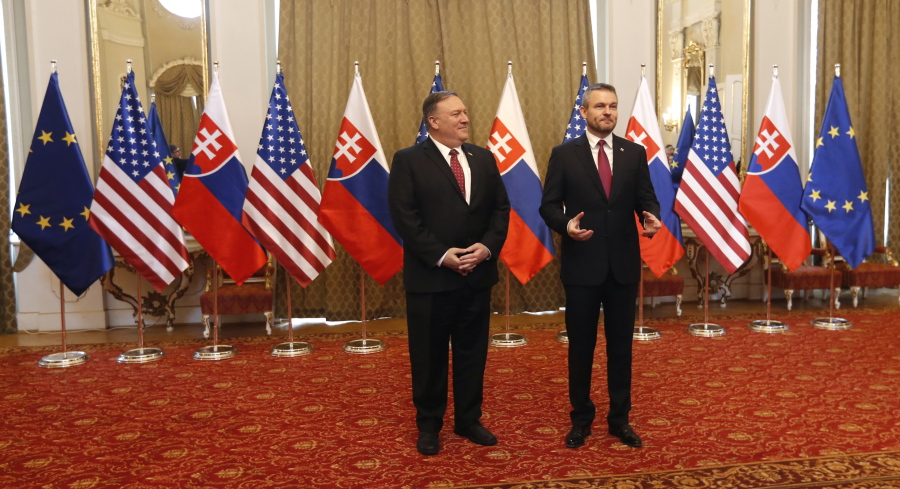WARSAW, Poland — U.S. Secretary of State Mike Pompeo on Tuesday invoked the 30th anniversary of the demise of communism to implore countries in Central and Eastern Europe to resist Chinese and Russian influence.
Speaking on a five-nation tour of Europe, Pompeo said China and Russia pose twin threats to the democratic and free-market gains made since the fall of the Berlin Wall in 1989.
He said the post-communist countries are particularly vulnerable to Chinese and Russian predatory investment and political meddling. Specifically, he called out European dependence on Russian energy, Russia’s backing of the Nord Stream 2 pipeline that many fear will increase that reliance and China’s entry into Europe’s telecommunications market through the high-tech company Huawei.
To combat the threat, he said, the U.S. will boost engagement in the region, through defense cooperation agreements and exchange programs and he repeatedly made the point that he believes he is reversing a decade of what he called U.S. “disengagement” in Central and Eastern Europe that created a “vacuum” Russia and China have exploited. Over the past 10 years, he said, Russian President Vladimir Putin and Chinese leaders have become much more aggressive in the region and made inroads.
“Moscow continues to use (energy) as a political weapon for its geopolitical purposes,” Pompeo said in Warsaw, the third stop on his tour that began in Hungary and Slovakia. “We continue to work with Poland and other like-minded European allies and partners to stop Russia’s proposed Nord Stream 2 pipeline, which would undermine European energy and national security while also hurting Ukraine.”
The Russian-German pipeline is being built under the Baltic Sea to deliver gas directly to Germany for further distribution across Europe, increasing the route’s capacity over what already flows through the first Nord Stream pipeline. But such Eastern European countries as Poland and Ukraine have vehemently objected to the project because they say it bypasses their territories.
Earlier in Bratislava, where he was the first secretary of state to visit in nearly 20 years, Pompeo made similar remarks and noted that Slovakia, because of its history and geography, has “a special appreciation for the aggressive role Russia continues to play in the region,” particularly in Ukraine.
But, he said, “Russia is not the only nation that seeks to erode sovereignty and freedom in Europe.”
Pompeo said he raised with Slovak officials the “need to guard against China’s economic and other efforts to create dependence and manipulate your political system.”
“It’s real, it’s intentional and they are trying to do things that undermine your sovereignty,” he said.
In Warsaw, Pompeo renewed a warning he delivered Monday in Budapest that the U.S. may be forced to scale back certain operations in Europe and elsewhere if countries continue to do business with Huawei. He said the U.S. had strong concerns about Huawei’s motives in Europe, especially in NATO and European Union member states, as well as its business practices.
“We’ve made known the risks that are associated with that, risks to private information of citizens of the country, risks that comes from having that technology installed in network systems,” he said.



